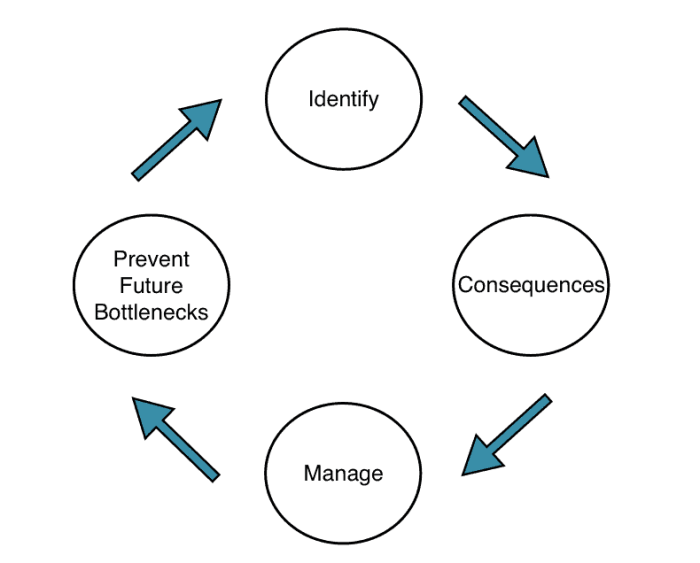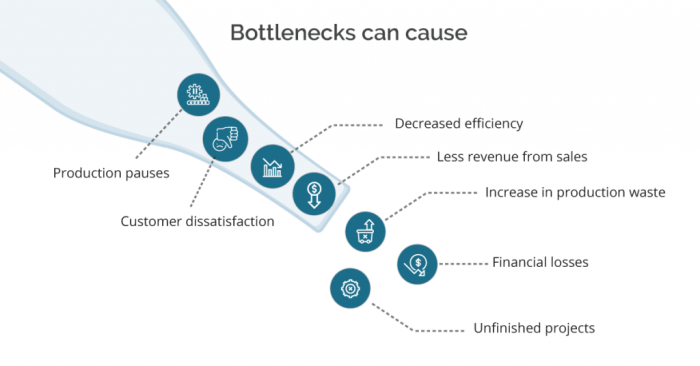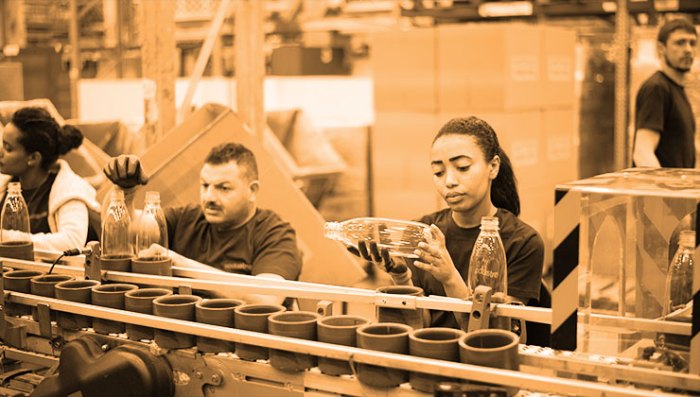Bottlenecks exist in which type of manufacturing processes – Bottlenecks, a prevalent issue in manufacturing processes, can significantly impact efficiency and productivity. Understanding the types of manufacturing processes in which bottlenecks commonly occur is crucial for optimizing operations and maximizing output.
This comprehensive analysis explores the concept of bottlenecks, their causes, and their varying manifestations across different manufacturing processes. It also provides practical strategies for identifying and resolving bottlenecks, minimizing their impact on efficiency, and enhancing overall manufacturing performance.
Bottlenecks in Manufacturing Processes

Bottlenecks are impediments or constraints within a manufacturing process that limit the overall production rate. They occur when a specific step or operation becomes the slowest in the sequence, hindering the smooth flow of materials and production.
Common bottlenecks in manufacturing include:
- Limited capacity of machines or workstations
- Inefficient material handling
- Labor shortages or skill gaps
- Quality control issues
- Supply chain disruptions
Causes of bottlenecks can be attributed to:
- Poor process design
- Lack of automation
- Inadequate training or staffing
- Equipment breakdowns or maintenance issues
- Unreliable suppliers
Types of Manufacturing Processes: Bottlenecks Exist In Which Type Of Manufacturing Processes

Different types of manufacturing processes exhibit unique characteristics and potential bottlenecks:
Continuous Processes
Continuous processes operate 24/7 with a steady flow of raw materials. Bottlenecks can arise due to:
- Equipment breakdowns
- Maintenance requirements
- Raw material shortages
Batch Processes
Batch processes produce specific quantities of products at a time. Bottlenecks can occur during:
- Setup and changeover times
- Labor-intensive operations
- Quality control inspections
Discrete Processes, Bottlenecks exist in which type of manufacturing processes
Discrete processes manufacture individual units or products. Bottlenecks can arise from:
- Assembly line imbalances
- Material handling inefficiencies
- Worker availability
Identifying and Resolving Bottlenecks

Identifying bottlenecks involves:
- Process mapping
- Cycle time analysis
- Capacity planning
- Performance monitoring
Strategies for resolving bottlenecks include:
- Automating processes
- Improving material handling
- Cross-training employees
- Optimizing equipment maintenance
- Redesigning processes
Successful bottleneck resolution strategies have resulted in:
- Increased production rates
- Reduced lead times
- Improved quality
- Lower production costs
Impact of Bottlenecks on Manufacturing Efficiency

Bottlenecks can severely impact manufacturing efficiency by:
- Limiting production capacity
- Increasing lead times
- Reducing product quality
- Raising production costs
- Hindering customer satisfaction
Quantifying the potential costs of bottlenecks involves:
- Estimating lost production
- Calculating increased labor costs
- Assessing inventory holding costs
- Evaluating customer dissatisfaction
Minimizing the impact of bottlenecks can be achieved through:
- Investing in automation
- Improving process design
- Optimizing inventory management
- Developing contingency plans
- Engaging in continuous improvement initiatives
Helpful Answers
What are the common causes of bottlenecks in manufacturing processes?
Common causes include machine breakdowns, material shortages, labor inefficiencies, and poor production planning.
How can bottlenecks impact manufacturing efficiency?
Bottlenecks can lead to production delays, increased costs, reduced output, and decreased customer satisfaction.
What are some effective strategies for resolving bottlenecks?
Strategies include investing in automation, implementing lean manufacturing principles, optimizing production schedules, and improving communication and coordination among team members.